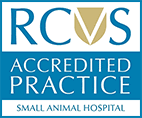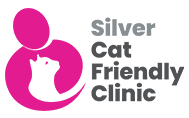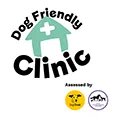Support your pet's oral health
Although it is frequently overlooked in pet care, oral health is an essential component of their general well-being.
Similar to people, our pets in Worcester may experience dental problems that result in discomfort, infection, and other health complications. There are ways you can help your pet maintain a healthy smile by being aware of the fundamentals of pet dentistry and putting in place a consistent oral hygiene regimen.
Why is oral health important for pets?
Your pet may experience severe pain and discomfort due to dental problems. Infections brought on by poor dental hygiene can spread to other organs, including the liver, kidneys, and heart. Additionally, dental issues may affect your pet's general quality of life, appetite, and energy levels.
Common oral problems in pets
Similar to us, our pets in Worcester can experience a range of dental problems. Tooth resorption, gingivitis, periodontal disease, and plaque and tartar accumulation are just a few of the most prevalent issues:
- Build-up of plaque and tartar: A sticky layer of microorganisms that can develop into tartar on teeth.
- Gingivitis: Gum inflammation brought on by plaque and tartar accumulation.
- Periodontal disease: A dangerous ailment that affects the gums and the tooth’s supporting tissues.
- Tooth disorders: A disorder known as tooth resorption occurs when the tooth's structure gradually disappears.
What are the common signs of oral problems in pets?
When observing your pet's oral health, these are the best indicators to look out for. If your pet starts experiencing any of the following, book an appointment with your vet at Brentknoll Vets to get a checkup; your vet can answer any questions and recommend the best treatments.
- Bad breath: A major indicator of dental problems is persistent bad breath.
- Gums that are red or swollen: Gum inflammation may be a sign of gum disease. Keep an eye on your pet’s chew toys, which may have blood stains on it. If so, this could also be an indication that something isn’t right.
- Challenged chewing or eating: Your pet may find it difficult to eat if their teeth hurt.
- Drooling: Too much salivation may indicate an illness or tooth pain.
- Appetite changes: Dental issues may be linked to weight loss or a decrease in appetite.
How to support your pet’s oral health
Establishing a thorough dental care regimen and recognising the signs is essential for your pet's oral health and general well-being. The following ways allow you to support and maintain the health of your pet's smile:
- To keep an eye on your pet's oral health and take care of any problems early, schedule routine dental checks with your vet.
- Include a daily or weekly dental hygiene regimen at home to help avoid the accumulation of plaque and tartar:
- Dental chews: Select dental chews made especially for the breed and size of your pet.
- Dental diets: Consider giving your pet a diet designed to assist lower tartar and plaque.
- Toothbrushing: Use a toothbrush and toothpaste made especially for pets to brush their teeth on a regular basis.
- To get rid of tartar and plaque accumulation, a nurse or vet at Brentknoll can arrange for your pet’s teeth to be cleaned professionally.
- Recognising the warning signs of dental issues and getting your pet's oral health checked by a nurse or vet when you observe any changes.
Additional tips for optimal oral health
You should constantly make sure your pet has access to fresh, clean water to keep their teeth healthy. Steer clear of feeding them human food since it can aggravate tooth issues. Look for any indications of redness, swelling, or missing teeth in their mouth on a regular basis. Your pet can have a longer, happier life with a bright, healthy smile if you follow these tips and collaborate closely with your vet in Worcester.
Book your pet’s dental checkup today
If you recognise any of these signs or just want peace of mind about your pet's oral health and how best you can support them. Book a visit to Brentknoll Vets today!








